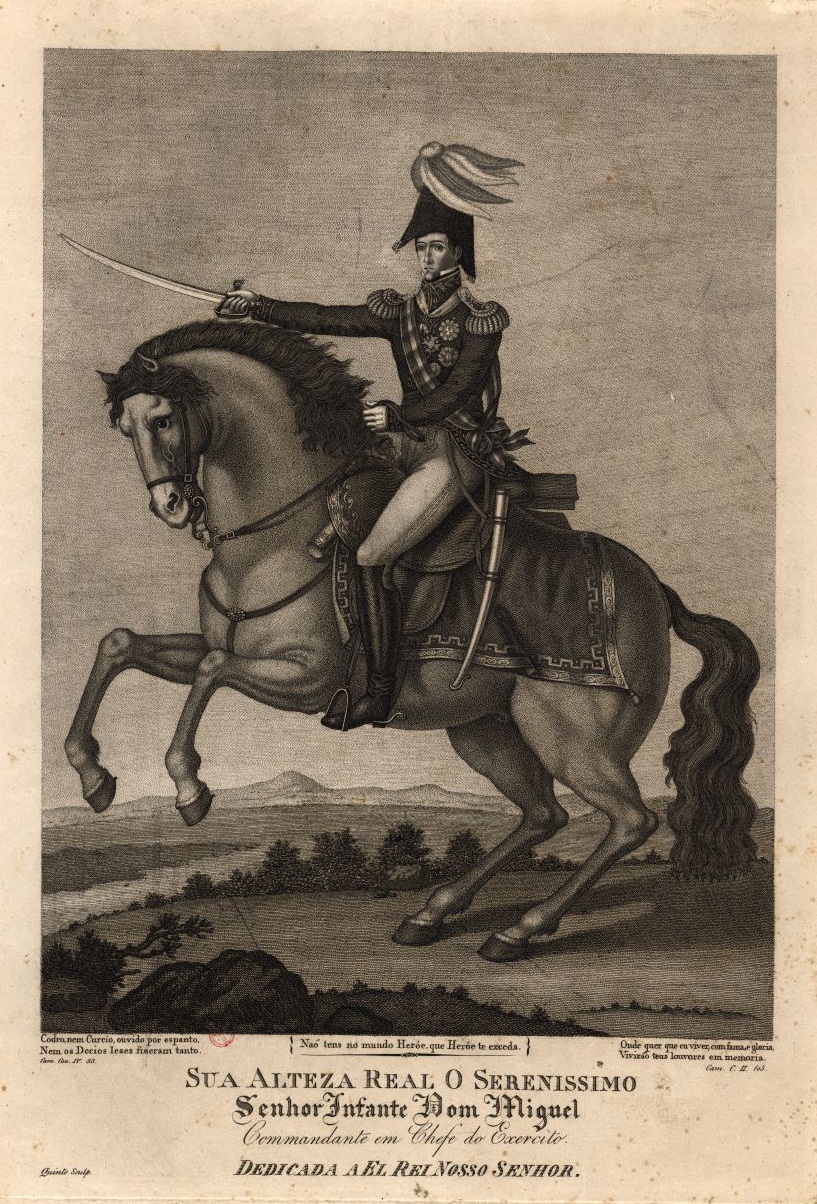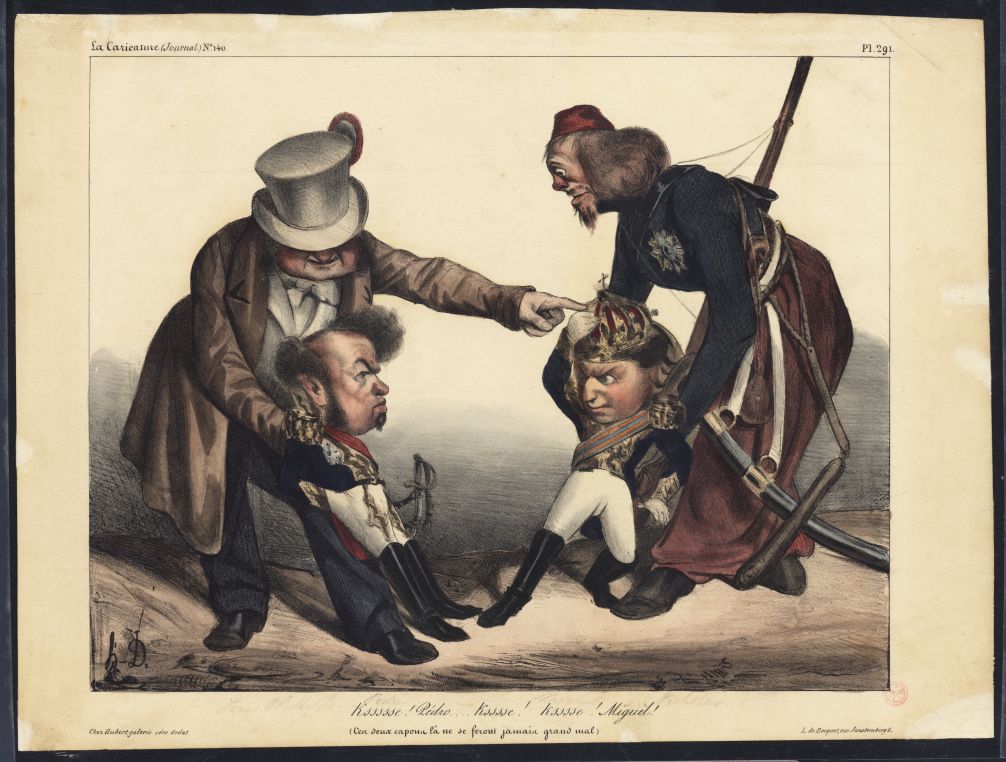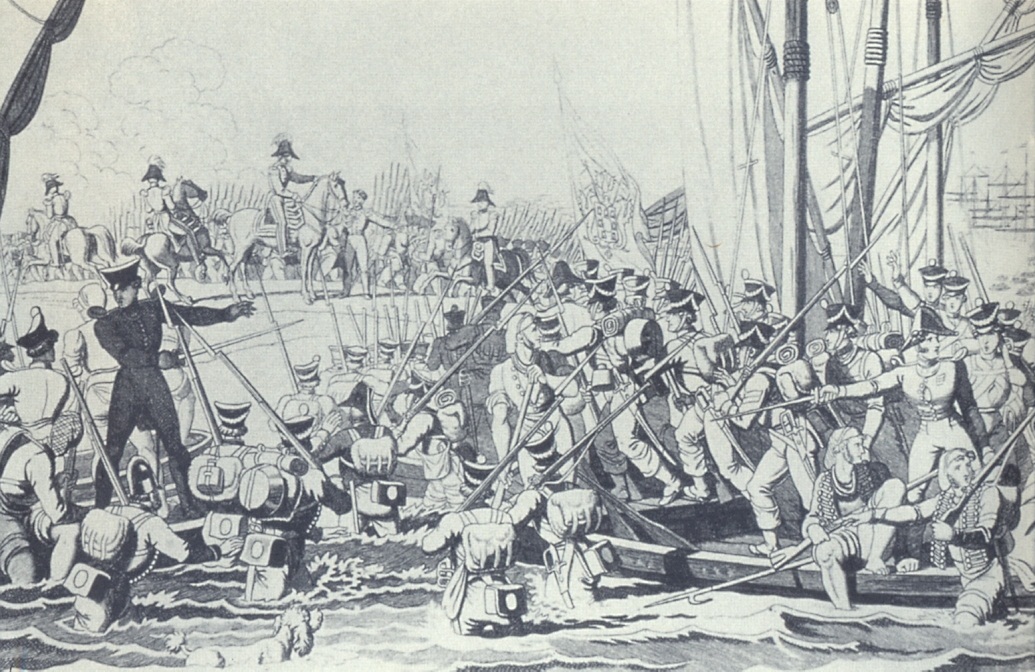|
History Of Portugal (1777–1834)
The history of the kingdom of Portugal and the Algarves, from the First Treaty of San Ildefonso and the beginning of the reign of Queen Maria I of Portugal, Maria I in 1777, to the end of the Liberal Wars in 1834, spans a complex historical period in which several important political and military events led to the end of the Absolutism (European history), absolutist regime and to the installation of a constitutional monarchy in the country. In 1807, Napoleon ordered the invasion of Portugal and subsequently the royal family and its entire court Transfer of the Portuguese Court to Brazil, migrated to Brazil, Maria I of Portugal, Maria I declaring the United Kingdom of Portugal, Brazil and the Algarves in 1815. This would be one of the causes for the declaration of Independence of Brazil, Brazilian independence by Pedro I of Brazil in 1822, following a liberal revolution in Portugal. The liberal period was stormy and short as Miguel of Portugal (Pedro's brother) supported an Abso ... [...More Info...] [...Related Items...] OR: [Wikipedia] [Google] [Baidu] |
First Treaty Of San Ildefonso
The First Treaty of San Ildefonso was signed on 1 October 1777 between Spain and Portugal. It settled long-running territorial disputes between the two kingdoms' possessions in South America, primarily in the Río de la Plata region. Background For nearly 300 years, differing interpretations of the Treaty of Tordesillas led to border disputes between Spain and Portugal over the Río de la Plata region. Although Spanish silver mines in Potosí were far to the west of the disputed area, Portugal constantly tried to annex the silver lode region to its Brazilian colonies. The two countries attempted to resolve their issues in the 1750 Treaty of Madrid but in 1761, it was annulled by the new Spanish monarch Charles III. In 1762, Spain entered the Seven Years' War on the side of France, resulting in the so-called Fantastic War of 1762-1763. With British support, the Portuguese repulsed a Franco-Spanish invasion in Europe. In South America, Spain captured the Portuguese port of Colo ... [...More Info...] [...Related Items...] OR: [Wikipedia] [Google] [Baidu] |
Miguel I Of Portugal
'' Dom'' Miguel I (26 October 1802 – 14 November 1866), known by several nicknames, was the King of Portugal between 1828 and 1834. He was son of King John VI and Queen Carlota Joaquina. Following his exile as a result of his actions in support of absolutism in the April Revolt (Abrilada) of 1824, Miguel returned to Portugal in 1828 as regent and fiancé of his niece Queen Maria II. As regent, he claimed the Portuguese throne in his own right, since according to the so-called Fundamental Laws of the Kingdom his older brother Pedro IV and therefore the latter's daughter had lost their rights from the moment that Pedro had made war on Portugal and become the sovereign of a foreign state (Brazilian Empire). This led to a difficult political situation, during which many people were killed, imprisoned, persecuted or sent into exile, and which culminated in the Portuguese Liberal Wars between authoritarian absolutists and progressive constitutionalists. In the end Miguel ... [...More Info...] [...Related Items...] OR: [Wikipedia] [Google] [Baidu] |
Miguel Of Portugal
'' Dom'' Miguel I (26 October 1802 – 14 November 1866), known by several nicknames, was the King of Portugal between 1828 and 1834. He was son of King John VI and Queen Carlota Joaquina. Following his exile as a result of his actions in support of absolutism in the April Revolt (Abrilada) of 1824, Miguel returned to Portugal in 1828 as regent and fiancé of his niece Queen Maria II. As regent, he claimed the Portuguese throne in his own right, since according to the so-called Fundamental Laws of the Kingdom his older brother Pedro IV and therefore the latter's daughter had lost their rights from the moment that Pedro had made war on Portugal and become the sovereign of a foreign state (Brazilian Empire). This led to a difficult political situation, during which many people were killed, imprisoned, persecuted or sent into exile, and which culminated in the Portuguese Liberal Wars between authoritarian absolutists and progressive constitutionalists. In the end Miguel w ... [...More Info...] [...Related Items...] OR: [Wikipedia] [Google] [Baidu] |
United Kingdom Of Portugal, Brazil And The Algarves
The United Kingdom of Portugal, Brazil and the Algarves was a pluricontinental monarchy formed by the elevation of the Portuguese colony named State of Brazil to the status of a kingdom and by the simultaneous union of that Kingdom of Brazil with the Kingdom of Portugal and the Kingdom of the Algarves, constituting a single state consisting of three kingdoms. The United Kingdom of Portugal, Brazil and the Algarves was formed in 1815, following the transfer of the Portuguese court to Brazil during the Napoleonic invasions of Portugal, and it continued to exist for about one year after the court's return to Europe, being '' de facto'' dissolved in 1822, when Brazil proclaimed its independence. The dissolution of the United Kingdom was accepted by Portugal and formalized ''de jure'' in 1825, when Portugal recognized the independent Empire of Brazil. During its period of existence the United Kingdom of Portugal, Brazil and the Algarves did not correspond to the whole of the ... [...More Info...] [...Related Items...] OR: [Wikipedia] [Google] [Baidu] |
Transfer Of The Portuguese Court To Brazil
The Portuguese royal court transferred from Lisbon to the Portuguese colony of Brazil in a strategic retreat of Queen Maria I of Portugal, prince regent John, the Braganza royal family, its court, and senior officials, totaling nearly 10,000 people, on 27 November 1807. The embarkment took place on 27 November, but due to weather conditions, the ships were only able to depart on 29 November. The Braganza royal family departed for Brazil just days before Napoleonic forces invaded Portugal on 1 December 1807. The Portuguese crown remained in Brazil from 1808 until the Liberal Revolution of 1820 led to the return of John VI of Portugal on 26 April 1821. For thirteen years, Rio de Janeiro functioned as the capital of the United Kingdom of Portugal, Brazil and the Algarves in what some historians call a metropolitan reversal (i.e., a colony exercising governance over the entirety of an empire). The period in which the court was located in Rio brought significant changes to the ... [...More Info...] [...Related Items...] OR: [Wikipedia] [Google] [Baidu] |
Constitutional Monarchy
Constitutional monarchy, also known as limited monarchy, parliamentary monarchy or democratic monarchy, is a form of monarchy in which the monarch exercises their authority in accordance with a constitution and is not alone in making decisions. Constitutional monarchies differ from absolute monarchies (in which a monarch is the only decision-maker) in that they are bound to exercise powers and authorities within limits prescribed by an established legal framework. A constitutional monarch in a parliamentary democracy is a hereditary symbolic head of state (who may be an emperor, king or queen, prince or grand duke) who mainly performs representative and civic roles but does not exercise executive or policy-making power. Constitutional monarchies range from countries such as Liechtenstein, Monaco, Morocco, Jordan, Kuwait, Bahrain and Bhutan, where the constitution grants substantial discretionary powers to the sovereign, to countries such as the United Kingdom and other Com ... [...More Info...] [...Related Items...] OR: [Wikipedia] [Google] [Baidu] |
Absolutism (European History)
Absolutism or the Age of Absolutism () is a historiographical term used to describe a form of monarchical power that is unrestrained by all other institutions, such as churches, legislatures, or social elites. The term 'absolutism' is typically used in conjunction with some European monarchs during the transition from feudalism to capitalism, and monarchs described as ''absolute'' can especially be found in the 16th century through the 19th century. Absolutism is characterized by the ending of feudal partitioning, consolidation of power with the monarch, rise of state power, unification of the state laws, and a decrease in the influence of the church and the nobility. Absolute monarchs are also associated with the rise of professional standing armies, professional bureaucracies, the codification of state laws, and the rise of ideologies that justify the absolutist monarchy. Absolutist monarchs typically were considered to have the divine right of kings as a cornerstone of th ... [...More Info...] [...Related Items...] OR: [Wikipedia] [Google] [Baidu] |
Liberal Wars
The Liberal Wars (), also known as the Portuguese Civil War () and the War of the Two Brothers () was a civil war in Portugal that lasted from May 1828 to May 1834, fought between liberal progressive constitutionalists (led by former King Pedro IV) and conservative traditionalists (led by King Miguel I) over the country's system of government and royal succession. Embroiled parties included the Kingdom of Portugal, Portuguese rebels, the United Kingdom, France, the Catholic Church, Spain and Russia. Roots of the conflict The death of King John VI in 1826 created a dispute over royal succession. While Dom Pedro, the Emperor of Brazil, was the king's oldest son, his younger brother Miguel contended that Pedro had forfeited his claim to the throne by declaring Brazilian independence and by declaring war on the Kingdom of Portugal, therefore violating the succession rules mentioned in the Fundamental Laws of the Kingdom. Pedro briefly entitled himself King Pedro IV of P ... [...More Info...] [...Related Items...] OR: [Wikipedia] [Google] [Baidu] |
Maria I Of Portugal
'' Dona'' Maria I (Maria Francisca Isabel Josefa Antónia Gertrudes Rita Joana; 17 December 1734 – 20 March 1816) also known as Maria the Pious in Portugal and Maria the Mad in Brazil, was Queen of Portugal from 24 February 1777 until her death in 1816. Maria was the first undisputed queen regnant of Portugal and the first monarch of Brazil. Maria was the eldest daughter of King Dom José I (Joseph I) of Portugal and Queen Mariana Victoria. As the heir to the throne, she held the titles of Princess of Brazil and Duchess of Braganza. She married her uncle Infante Pedro (Peter) in 1760. They had six children, of whom three survived infancy: José, João (John), and Mariana Vitória. The death of King José in 1777 placed Maria, then 42 years old, on the throne. Her husband Pedro was nominally king alongside her as Dom Pedro III. Upon ascending the throne, Maria dismissed her father's powerful chief minister, Sebastião José de Carvalho e Melo, 1st Marquis of Pombal. The ... [...More Info...] [...Related Items...] OR: [Wikipedia] [Google] [Baidu] |
Kingdom Of Portugal And The Algarves
Kingdom commonly refers to: * A monarchic state or realm ruled by a king or queen. ** A monarchic chiefdom, represented or governed by a king or queen. * Kingdom (biology), a category in biological taxonomy Kingdom may also refer to: Arts and media Television * ''Kingdom'' (British TV series), a 2007 British television drama starring Stephen Fry * ''Kingdom'' (American TV series), a 2014 US television drama starring Frank Grillo * ''Kingdom'' (South Korean TV series), a 2019 South Korean television series *'' Kingdom: Legendary War'', a 2021 South Korean television series * Kingdom (Friday Night Lights), an episode of the TV series Friday Night Lights * "Kingdom" (''Runaways''), an episode of ''Runaways'' Music * Kingdom (group), a South Korean boy band * ''Kingdom'' (Koda Kumi album), 2008 * ''Kingdom'' (Bilal Hassani album), 2019 * ''Kingdom'' (Covenant Worship album), 2014 * ''Kingdoms'' (Life in Your Way album), 2011 * ''Kingdoms'' (Broadway album), 2009 * ''Kingd ... [...More Info...] [...Related Items...] OR: [Wikipedia] [Google] [Baidu] |
Hino Da Carta
The ''Hymno da Carta'' (, modern Portuguese spelling: ''Hino da Carta'') was officially proclaimed the national anthem of the Kingdom of Portugal in May 1834. It was composed by King Pedro I of Brazil, Pedro IV of Portugal. "Carta" stands for the Constitutional Charter which Pedro IV granted to Portugal. The anthem remained officially in place until 19 July 1911, nine months after Portugal became a republic, and was replaced by ''A Portuguesa''. Lyrics See also *A Portuguesa *Hymno Patriótico References External links Music Sheet Download the anthem ''Hino da Carta'' {{Authority control Historical national anthems Royal anthems Portuguese anthems Kingdom of Portugal Songs in Portuguese Portuguese patriotic songs Compositions in E-flat major ... [...More Info...] [...Related Items...] OR: [Wikipedia] [Google] [Baidu] |






